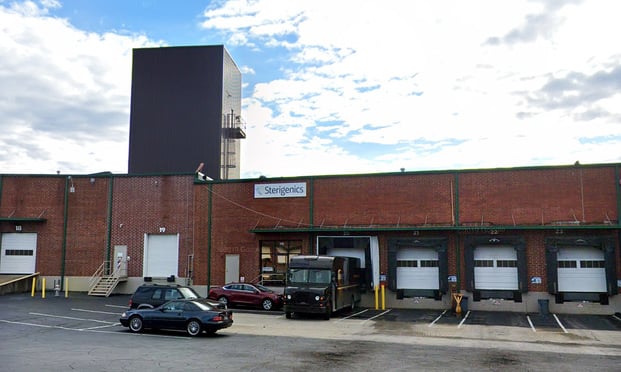Federal Judge Permits Troubled Sterilization Plant to Resume Full Operations
Shut down over ethylene oxide emissions last year, Sterigenics was allowed to temporarily resume sterilizations of personal protective equipment, about 20% of its former business. Plant lawyers said that wasn't enough, and a federal judge agreed.
April 01, 2020 at 02:14 PM
4 minute read
 Sterigenics International Inc. in Atlanta. (Photo: Google)
Sterigenics International Inc. in Atlanta. (Photo: Google)
A federal judge in Atlanta issued a temporary restraining order Wednesday morning allowing a troubled Cobb County medical sterilization plant to resume normal operations for the next two weeks.
 Judge William Ray. (Photo: John Disney/ALM)
Judge William Ray. (Photo: John Disney/ALM)U.S. District Judge William "Billy" Ray issued the order less than 48 hours after Sterigenics U.S. sought an emergency TRO and declaratory judgment—even though Cobb County authorities had already permitted the plant to temporarily reopen under county oversight on an emergency basis. However, the county's March 25 order limited sterilization operations to medical personal protective equipment.
Ray's order permits Sterigenics to resume full sterilization operations for an array of medical equipment—including ventilator components—"without interference" from Cobb County Fire Marshal Nicholas Dawe and Kevin Gobble, the Cobb County Community Development Agency's development and inspections manager.
Sterigenics lawyers said in court papers that the Smyrna plant can sterilize more than a million essential, critically needed medical products daily when operating at capacity.
Ray has scheduled an April 14 hearing on Sterigenics' motion for a preliminary injunction.
Sterigenics' Smyrna plant, one of five medical device sterilization facilities in Georgia, was shut down by county officials over local code violations last September. They are requiring the plant to implement upgrades that would reduce its emissions of ethylene oxide, a gas used in the sterilization process that the U.S. Environmental Protection Agency has concluded is carcinogenic.
Last fall, Cobb County and the cities of Smyrna and Atlanta installed monitors around the plant to test ethylene oxide levels. They did so following protests by residents living nearby who were alarmed by an EPA report finding elevated cancer levels.
Sterigenics claims the plant was shut down by county officials "based on unfounded environmental claims the county has no authority to regulate." Sterigenics' pleadings singled out a concerned citizens group, Stop Sterigenics, that it claimed attracted "significant attention from the local media and local politicians" and resulted in multiple town hall meetings where commissioners were "attacked by activists."
The plant's legal team also cited a U.S. Food and Drug Administration warning issued last October that the plant's closure could lead to a shortage of some sterile medical devices, and a federal emergency order that their services have been designated as "scarce." The lawyers assured the court that Sterigenics "voluntarily installed" more than $2 million in equipment to address ethylene oxide emissions last year.
The lawyers also argued any alleged harm is "substantially outweighed" by the risk of harm to Sterigenics, which they said would "lose substantial revenue," and to health care providers and their patients.
Sterigenics is represented by a team of Alston & Bird attorneys led by Daniel Diffley, co-chair of the firm's litigation and trial practice group, and Clay Massey in the firm's environment, land use and natural resources practice group. Diffley and Massey couldn't immediately be reached for comment. Sterigenics released a statement saying it was pleased the order allows the plant to fully resume sterilization operations "without product limitation" and that it is "proceeding to establish our right to continue the safe operation of our longstanding facility."
Cobb County spokesman Ross Cavitt said county authorities wouldn't comment on the ruling. Fred Bentley of Marietta firm Bentley, Bentley & Bentley, who represents the county defendants, also declined to comment.
But county lawyers countered in their response that Sterigenics has "a checkered past," including plant explosions in California and Spain. They also cited statistical evidence of "a direct correlation" between ethylene oxide emissions and cancer rates of nearby residents.
They also raised concerns about Sterigenics' installation of an air scrubbing system without a county inspection and repeated requests by county authorities for engineer drawings and fire safety plans that "fell on deaf ears."
"There are significant public safety issues" as well as " serious doubt that Sterigenics should be able to simply bypass these safety related issues," county lawyers added.
"Most importantly, Sterigenics currently has the full authority to open and process personal protective equipment ("PPE"), which is precisely and specifically what was requested by the FDA," they said.
NOT FOR REPRINT
© 2025 ALM Global, LLC, All Rights Reserved. Request academic re-use from www.copyright.com. All other uses, submit a request to [email protected]. For more information visit Asset & Logo Licensing.
You Might Like
View All

Upcoming Changes to Medicare Secondary Payer Reporting: What WC Insurers and Attorneys Need to Know
5 minute read
Biden Administration Tells Justices That Bans on Gender Care Are Sex Discrimination

11th Circuit Allows Florida Transgender Health Care Ban to Continue Pending Full Appeal on Constitutionality of Law
Law Firms Mentioned
Trending Stories
Who Got The Work
J. Brugh Lower of Gibbons has entered an appearance for industrial equipment supplier Devco Corporation in a pending trademark infringement lawsuit. The suit, accusing the defendant of selling knock-off Graco products, was filed Dec. 18 in New Jersey District Court by Rivkin Radler on behalf of Graco Inc. and Graco Minnesota. The case, assigned to U.S. District Judge Zahid N. Quraishi, is 3:24-cv-11294, Graco Inc. et al v. Devco Corporation.
Who Got The Work
Rebecca Maller-Stein and Kent A. Yalowitz of Arnold & Porter Kaye Scholer have entered their appearances for Hanaco Venture Capital and its executives, Lior Prosor and David Frankel, in a pending securities lawsuit. The action, filed on Dec. 24 in New York Southern District Court by Zell, Aron & Co. on behalf of Goldeneye Advisors, accuses the defendants of negligently and fraudulently managing the plaintiff's $1 million investment. The case, assigned to U.S. District Judge Vernon S. Broderick, is 1:24-cv-09918, Goldeneye Advisors, LLC v. Hanaco Venture Capital, Ltd. et al.
Who Got The Work
Attorneys from A&O Shearman has stepped in as defense counsel for Toronto-Dominion Bank and other defendants in a pending securities class action. The suit, filed Dec. 11 in New York Southern District Court by Bleichmar Fonti & Auld, accuses the defendants of concealing the bank's 'pervasive' deficiencies in regards to its compliance with the Bank Secrecy Act and the quality of its anti-money laundering controls. The case, assigned to U.S. District Judge Arun Subramanian, is 1:24-cv-09445, Gonzalez v. The Toronto-Dominion Bank et al.
Who Got The Work
Crown Castle International, a Pennsylvania company providing shared communications infrastructure, has turned to Luke D. Wolf of Gordon Rees Scully Mansukhani to fend off a pending breach-of-contract lawsuit. The court action, filed Nov. 25 in Michigan Eastern District Court by Hooper Hathaway PC on behalf of The Town Residences LLC, accuses Crown Castle of failing to transfer approximately $30,000 in utility payments from T-Mobile in breach of a roof-top lease and assignment agreement. The case, assigned to U.S. District Judge Susan K. Declercq, is 2:24-cv-13131, The Town Residences LLC v. T-Mobile US, Inc. et al.
Who Got The Work
Wilfred P. Coronato and Daniel M. Schwartz of McCarter & English have stepped in as defense counsel to Electrolux Home Products Inc. in a pending product liability lawsuit. The court action, filed Nov. 26 in New York Eastern District Court by Poulos Lopiccolo PC and Nagel Rice LLP on behalf of David Stern, alleges that the defendant's refrigerators’ drawers and shelving repeatedly break and fall apart within months after purchase. The case, assigned to U.S. District Judge Joan M. Azrack, is 2:24-cv-08204, Stern v. Electrolux Home Products, Inc.
Featured Firms
Law Offices of Gary Martin Hays & Associates, P.C.
(470) 294-1674
Law Offices of Mark E. Salomone
(857) 444-6468
Smith & Hassler
(713) 739-1250






